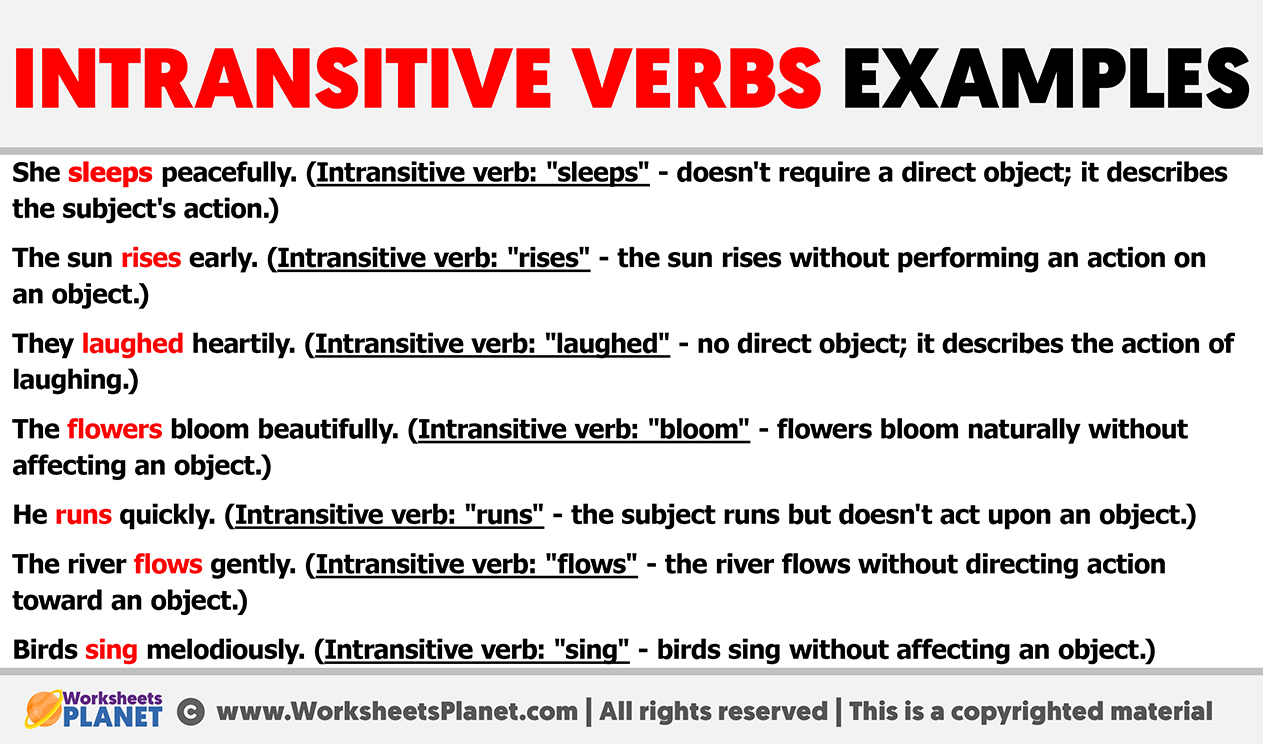An intransitive verb is a verb that does not require a direct object to complete its meaning in a sentence. It typically conveys an action or state performed by the subject without acting on an object.

Some examples of sentences with intransitive verbs
- She sleeps peacefully. (Intransitive verb: “sleeps” – doesn’t require a direct object; it describes the subject’s action.)
- The sun rises early. (Intransitive verb: “rises” – the sun rises without performing an action on an object.)
- They laughed heartily. (Intransitive verb: “laughed” – no direct object; it describes the action of laughing.)
- The flowers bloom beautifully. (Intransitive verb: “bloom” – flowers bloom naturally without affecting an object.)
- He runs quickly. (Intransitive verb: “runs” – the subject runs but doesn’t act upon an object.)
- The river flows gently. (Intransitive verb: “flows” – the river flows without directing action toward an object.)
- Birds sing melodiously. (Intransitive verb: “sing” – birds sing without affecting an object.)
- She dances gracefully. (Intransitive verb: “dances” – she dances without performing an action on something.)
- The wind blows softly. (Intransitive verb: “blows” – the wind blows without impacting an object.)
- They arrived early. (Intransitive verb: “arrived” – no direct object; it describes the action of arriving.)
- The leaves rustle in the breeze. (Intransitive verb: “rustle” – leaves rustle naturally without acting upon an object.)
- The cat jumped playfully. (Intransitive verb: “jumped” – the cat jumped without affecting an object.)
- Rain falls steadily. (Intransitive verb: “falls” – rain falls without performing an action on something.)
- He sings passionately. (Intransitive verb: “sings” – he sings without directing the action towards an object.)
- The baby giggles joyfully. (Intransitive verb: “giggles” – the baby giggles without impacting an object.)
- The students listen attentively. (Intransitive verb: “listen” – the students listen without performing an action on an object.)
- Leaves fall gently. (Intransitive verb: “fall” – leaves fall naturally without acting upon an object.)
- The fire burns brightly. (Intransitive verb: “burns” – the fire burns without affecting an object.)
- They talk animatedly. (Intransitive verb: “talk” – they talk without directing the action towards an object.)
- The waterfall cascades beautifully. (Intransitive verb: “cascades” – the waterfall cascades naturally without acting upon something.)
- The child cried loudly. (Intransitive verb: “cried” – the child cries without performing an action on an object.)
- The athlete trains diligently. (Intransitive verb: “trains” – the athlete trains without affecting an object.)
- The leaves swayed gracefully. (Intransitive verb: “swayed” – leaves sway naturally without acting upon something.)
- The musician performs skillfully. (Intransitive verb: “performs” – the musician performs without directing the
- action towards an object.)
- The waves crash loudly. (Intransitive verb: “crash” – waves crash naturally without performing an action on something.)
- She yawns tiredly. (Intransitive verb: “yawns” – she yawns without directing the action towards an object.)
- The dog barks loudly. (Intransitive verb: “barks” – the dog barks without performing an action on something.)
- The engine purrs quietly. (Intransitive verb: “purrs” – the engine purrs without affecting an object.)
- They walk briskly. (Intransitive verb: “walk” – they walk without directing the action towards an object.)
- The leaves flutter in the wind. (Intransitive verb: “flutter” – leaves flutter naturally without acting upon something.)

